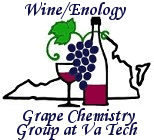
Enology Notes
Enology Notes # 93 August 27, 2004
To: Regional Wine Producers
From: Bruce Zoecklein, Head, Wine/Enology-Grape Chemistry Group, Virginia Tech
Subjects: Juice and Wine Analysis Short Course, Wine Barrel Survey, New Edition of Winery Planning and Design Manual Available, Issues for the Season, Volatile Sulfur Compounds
- Juice and Wine Analysis Short Course. The Wine/Enology-Grape Chemistry
Group will offer a two-day juice and wine analysis short course January
11 and 12, 2005. This program will be a hands-on, practically oriented laboratory
course for beginners and those desiring to 'brush up' on lab skills. It
will be conducted in the teaching laboratory of the Food Science and Technology
Building at Virginia Tech.
This program will include the following:
- The winery laboratory
Good laboratory practices
Fruit processing basics
Maturity indices
pH basics
Titration and titratable acidity
Fermentable nitrogen
Sugars
Alcohol
Protein stability
Bitartrate stability
Organic acids
Volatile acidity
Sulfur dioxide and sulfur-containing compounds
Dissolved oxygen
Registrants will participate in hands-on analysis. Analyses will be supplemented with discussions concerning the practical winemaking significance of each test.
Enrollment is Limited and Restricted: The short course will be limited to a total of 14 participants. Only one person per bonded Virginia winery may register. Registration is for both days. Preference will be given to bonded winery representatives who register BEFORE MONDAY, NOVEMBER 15, 2004.
After November 15, open enrollment will be offered if space is available. At that time, preference will be given to those who intend to open commercial wineries within the next three years.
Registration: Register by sending an email message to my secretary, Terry Rakestraw, at rakestra@vt.edu. If you are associated with a commercial Virginia winery, please indicate. Detailed information will be mailed to registrants prior to the short course.
Cost: $250 per person. This includes the short course fee plus two lunches and an evening reception. The complete registration fee is due NO LATER THAN December 15, 2004. Checks are to be written payable to Virginia Tech Foundation and mailed to Bruce Zoecklein, Department of Food Science and Technology (0418), Virginia Tech, Blacksburg, VA 24061. Course fee is non-refundable.
Supplemental Text: It is suggested that registrants have a copy of Wine Analysis and Production, Zoecklein et al. (1995) for this short course. If you have a copy, bring it to Blacksburg. Books will be available at the time of the program at the discounted rate of $75 each. Books will be available through my office to registrants only.
Other short course programs planned include:- Fining and Filtration
- Wine Closures
- Sulfite Management
Details will be provided in subsequent Enology Notes. - Wine Barrel Survey. Wine Business Monthly is conducting its 4th annual
barrel survey. The goal is to gather data which will allow for the analysis
of trends in barrels and barrel alternatives.
We would like to include as many east/midwest producers as possible. Please complete this survey at http://www.winebusiness.com/survey/barrelsurvey2004.cfm.
Results will be available in November. - New Edition of Winery Planning and Design Manual Available. Edition #8 is 237 pages long and reviews a variety of subjects discussed during seven Winery Planning and Design short courses given throughout the country. Details are available on the web at www.vtwines.info.
- Issues for the Season. Previous editions of Enology Notes and Vintner’s
Corner newsjournal have discussed harvest season topics, including maturity
evaluation, nitrogen measurements by formol titration, fermentation and
lees management, etc.
All past issues are posted under Extension on-line at www.vtwines.info. From the homepage, click either Enology Notes or Vintner’s Corner. Subject indexes are provided. - Volatile Sulfur Compounds in Winemaking. Volatile surfur compounds are
important contributors to both desirable and undesirable or unpleasant
aromas. As discussed in previous editions of Enology Notes (#26, 70, 71,
76 and 79),
not all the mechanisms that produce these compounds are fully understood.
What is understood is that it is better to help prevent the occurrence of
VSCs in
winemaking, rather than attempting to reduce sensory impact after production.
The common way of dealing with many VSCs is to add copper in the form of cupric sulfate. Aside from reducing varietal intensity, copper can, on occasion, increase off-odors.
A review of the main sources of VSC production prior to harvest is important. Factors most often responsible include those listed below. For additional information, see Enology Notes and Vintner’s Corner indexes at www.vtwines.info.- Elemental sulfur residue from vineyard sprays. This is a well-known contributor to VSCs and is an important reason for the establishment of a viticulture HACCP-like plan.
- High white juice NTU or turbidity level. The impact of turbidity level is somewhat varietal dependent. However, the higher the level, the greater the production of most VSCs. Attempting to ferment brilliantly-clear juice can, of course, also produce high concentrations of VSCs and may cause stuck fermentations. Turbidity levels also impact other fermentation volatiles-too high results in reduction in esters and an increase in long-chain alcohols.
- Must fermentable nitrogen concentration. A minimum of 140 mg/L fermentable N is required. See Enology Notes, Formol Titration.
- Other nutrients. This is a large issue with rot-degradated fruit, and another important reason for fruit culling.
- Yeast strains.
- Inadequate aeration during fermentation.
- Heavy vs. light lees contact.
![]()
Subscription to Enology Notes. All past Enology Notes newsjournals are posted on the Enology-Grape Chemistry Group's web site at: http://www.vtwines.info/. Enology Notes are slightly different in content from the subscription based Vintner's Corner newsjournal.
To be added to (or removed from) the Enology Notes listserve send an email message to with the word "ADD" or "REMOVE" in the subject line.
Dr. Bruce
Zoecklein
Professor and Enology Specialist Head Enology-Grape Chemistry Group
Department of Food Science and Technology, Virginia Tech
Blacksburg VA 24061
Enology-Grape Chemistry Group Web address: http://www.vtwines.info/
Phone: (540) 231-5325
Fax: (540) 231-9293
Email: